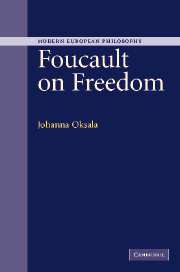5 - Anarchic bodies
Published online by Cambridge University Press: 26 October 2009
Summary
Be a philosopher, be a mummy, represent monotono-theism by a gravedigger-mimicry – And away, above all, with the body, that pitiable idée fixe of the senses! Infected with every error of logic there is, refuted, impossible even, notwithstanding it is impudent enough to behave as if it actually existed!
(Nietzsche 1889/1990, 45)Foucault's understanding of the historical constitution of the body through the network of power/knowledge has influenced feminist theory profoundly: it has provided a way to theorize the body in its materiality while avoiding all essentialist formulations, and has given tools for understanding the disciplinary production of the female body. While a shared focus on bodies has opened up important connections between feminist theory and Foucault's thought, Foucault's apparent denial of the body's capacity for resistance has also been critically pointed out by several feminist writers. It has been argued that Foucault understands the body as too culturally malleable, and that his conception of it is thus one-sided and limited for feminist purposes.
In order to evaluate Foucault's account of the body from the perspective of feminist theory, we must first ask what exactly is meant by the Foucaultian body. The feminist appropriations are based on varying readings of it. Foucault did not present a theory of the body anywhere, or even a unified account of it, and thus his conception of it has to be discerned from his genealogical books and articles, which aim at bringing the body into the focus of history.
- Type
- Chapter
- Information
- Foucault on Freedom , pp. 110 - 134Publisher: Cambridge University PressPrint publication year: 2005

